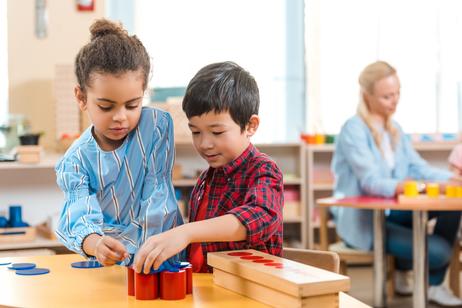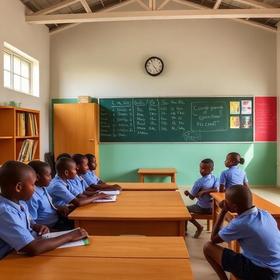Maria Montessori (1870-1952), an Italian physician, and educator, made significant contributions to the field of education. Throughout her career, she wrote numerous articles and publications focusing on her educational philosophy and methodology. If you are considering sending your child to a Montessori school, you will find reading Dr. Montessori's writings worthwhile.
A word of caution: Dr. Montessori never trademarked her name. As a result, just because a school has the name Montessori doesn't mean it is the real thing. Caveat emptor! Buyer beware! Read 5 Clues That It Might Not Really Be A Montessori School to see what I mean.
Here are some notable articles written by Maria Montessori:
"The Montessori Method" (1909)
Considered one of Dr. Montessori's most influential works, this article introduced Montessori's innovative educational approach, emphasizing the importance of the prepared environment, freedom of choice, and hands-on learning experiences.
"The Montessori Elementary Material" (1917)
In this article, Montessori discussed the materials and activities she designed specifically for the elementary level, highlighting the role of independence, exploration, and abstraction in children's education.
"The Four Planes of Education" (1949)
Montessori outlined her theory of the four planes of development, which proposed that children go through distinct stages of growth and learning, each with its own characteristics and educational needs.
"The Secret of Childhood" (1936)
In this article, Montessori explored childhood's psychological and developmental aspects, emphasizing the importance of creating an environment that nurtures the child's natural tendencies and promotes self-discipline.
"Education for a New World" (1946)
Montessori discussed the need for an educational approach that fosters peace, global understanding, and social responsibility. She emphasized the importance of education in shaping a better future for humanity.
"The Absorbent Mind" (1949)
This article delved into Montessori's understanding of the young child's mind as a sponge-like entity capable of absorbing knowledge effortlessly and enthusiastically. She emphasized the importance of providing rich and stimulating experiences during this critical period.
"Education and Peace" (1949)
Montessori explored the relationship between education and the establishment of lasting peace. She advocated for an education that promotes understanding, empathy, and cooperation among individuals and cultures.
These are just a few examples of the many articles Maria Montessori wrote throughout her career. Her writings continue to inspire and guide educators worldwide, and they remain relevant in education today.
This video offers a look at Montessori education.
Overview of the Montessori Method
This expanded section provides a more detailed overview of the Montessori Method, highlighting its philosophy, principles, age-range approach, and benefits. In addition, it serves as a foundation for understanding the subsequent sections of the blog post or article.
Philosophy of Education
- Emphasis on the child as an active participant in their learning process
- Recognition of each child's unique potential and the importance of nurturing their individual development
- Focus on the holistic development of the child - intellectual, social, emotional, and physical aspects
Key Principles
- Respect for the child: Montessori believed in respecting the child's dignity, autonomy, and innate curiosity.
- Prepared environment: The environment is carefully prepared to support independent learning and exploration, with materials and activities that cater to the child's developmental needs.
- Self-directed learning: Montessori education encourages children to take ownership of their learning by allowing them to choose their activities and work at their own pace.
- Hands-on learning: Using specially designed materials promotes hands-on, experiential learning and allows children to explore abstract concepts through concrete experiences.
- Individualized instruction: Montessori teachers observe and assess each child's progress and provide personalized guidance and support.
Age-Range Approach
- Montessori education spans various age ranges, including early childhood (2-6 years), elementary (6-12 years), and beyond.
- Each age range has specific developmental characteristics and corresponding educational goals, with tailored materials and activities.
Collaboration and Social Development
- Montessori classrooms foster a sense of community and cooperation, encouraging children to work together, respect one another, and develop empathy.
- Multi-age classrooms allow older children to mentor younger ones, promoting a collaborative learning environment.
Integration of Practical Life Skills
- Practical life activities, such as pouring, dressing, and cleaning, are integrated into the curriculum to develop motor skills, independence, and a sense of responsibility.
- Practical life activities provide a bridge between home and school, allowing children to engage in meaningful tasks that contribute to their daily lives.
Role of the Teacher
- The Montessori teacher serves as a guide, facilitator, and observer of the child's progress.
- The teacher creates a prepared environment, introduces materials, and offers individual and small-group lessons based on the child's readiness and interests.
- The teacher nurtures the child's intrinsic motivation, encourages curiosity, and provides gentle guidance.
Impact and Benefits
- Montessori education has been found to promote independence, self-confidence, love for learning, and intrinsic motivation in children.
- Research suggests that Montessori students tend to demonstrate strong academic, social, and problem-solving skills.
- The Montessori Method is known for nurturing lifelong learners with critical thinking abilities, adaptability, and a sense of responsibility towards themselves and the world around them.
This video explains Montessori education.
A Comparison of the Educational Approaches of Maria Montessori and Rudolf Steiner
Here is a comparison of the educational approaches of Maria Montessori, and Rudolf Steiner, the founder of Waldorf Schools. While Montessori and Steiner significantly contributed to alternative education, they developed distinct philosophies and methodologies.
Maria Montessori's educational approach emphasizes independence, individualized learning, and hands-on experiences. She believed in creating an environment where children could explore and discover at their own pace. Montessori classrooms are structured with specific learning materials and a focus on practical life skills. The teacher's role is to guide and observe rather than dictate instruction.
On the other hand, Rudolf Steiner's Waldorf education focuses on a holistic development of the child's spiritual, intellectual, and physical capacities. The curriculum integrates arts, music, movement, and practical activities with academic subjects. Waldorf schools promote imaginative play and creativity while fostering a deep connection to nature. Teachers in Waldorf education often stay with the same class for multiple years to build strong relationships with the students.
While Montessori and Steiner value experiential learning and child-centered education, their approaches differ in structure and emphasis. Montessori's approach leans toward individual autonomy and concrete materials. In contrast, Steiner's approach emphasizes a harmonious development of body, mind, and spirit through artistic expression.
Maria Montessori's educational approach focuses on individualized learning and independent exploration. At the same time, Rudolf Steiner's Waldorf education emphasizes holistic development and artistic expression. Both approaches offer unique perspectives on alternative education, providing options for parents and educators to consider based on their educational philosophies and goals.
Questions? Contact us on Facebook. @privateschoolreview
#Montessori #MontessoriEducation #ChildCenteredLearning #HandsOnLearning













